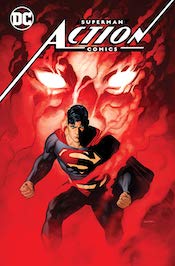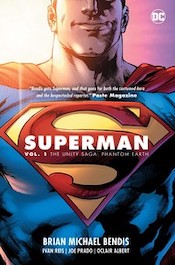Thursday Comics Hangover: Superman done right
Some three years ago on this website, I wrote about why Superman is a difficult character to write, and why most writers get Superman wrong. The thesis statement is here:
When you’re writing a Superman story, you’re not trying to find his toughest opponent, or his most difficult physical challenge. None of that stuff—super-speed, laser beams—matters at all. Instead, you’re trying to challenge the idea of morality.
If you'd ask me to name one modern writer who understands that Superman comics need to be an examination of goodness and morality, I'd name Grant Morrison, whose All-Star Superman is one of the first Superman books I'd give to someone who wanted to understand the character.


So far as I can tell, only one other writer in the 21st century has come close to Morrison in terms of understanding why Superman is a compelling character. That writer is Brian Michael Bendis, and he's currently writing the character in both the Superman title and in Action Comics, the title where Superman first debuted over eighty years ago.
The first collected edition of Bendis's run on Superman, The Unity Saga: Phantom Earth, came out back in late February. It immediately demonstrated that Bendis intuitively understands the character of Superman: he's kind, and he's compassionate, and while he doesn't always know what's the best thing to do, he certainly tries to do the right thing every time.
The structure of Phantom Earth is a little bit wonky. The plot involves Earth suddenly transporting to Krypton's intergalactic prison, The Phantom Zone, and it ties in with Bendis's ongoing story involving Rogol Zaar, an intergalactic eeeeevil bad guy who may have wiped out Krypton. (Rogol Zaar is Bendis's biggest misstep in the Superman comics thus far; he's a monster through and through and he's very strong. In other words, he's exactly what a Superman foe should not be.) What seems like a major plot revelation is tossed off toward the end of the book in a jokey fashion that smashes the world-threatening stakes established in the opening chapters. The book is trying a little too hard to impress reader, leaving a sense that it's overpromising and under-delivering.
But it's worth reading Phantom Earth just for the characterization of Superman. He appeals to a super-villain's better nature when she tries to commit a petty crime in the middle of an intergalactic threat. ("Why don't you try helping?!") He never gives up. He worries about setting a good example.
Thankfully, Bendis's Action Comics is at once a great character showcase and a fun Superman story. This is pretty much everything you'd want out of a Superman comic: daily goings-on at the Daily Planet, a mix of villains to fight, a glimpse into what life is like in Metropolis on a daily basis, and an ongoing soap opera.
But most of all, you get a lot of Bendis's Superman. This is a superhero who takes the time to hug and comfort the people he's just saved. He tells them that there's no shame in looking up a trauma counselor. He encourages them to go to the hospital and make sure everything's okay. He makes people want to be better.